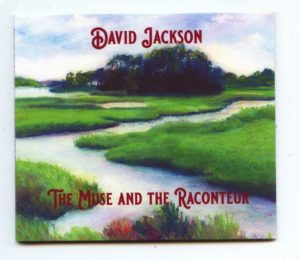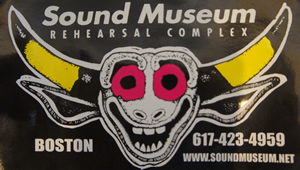 David Jackson’s latest disc The Muse And The Raconteur is a mix of cool acoustic guitar, restless blues, and a sensitive singer-songwriter sensibility. Presentation is more of Jackson’s strong suit here. This Cape Cod-based artist plays some standards, traditional songs, and he has his friends collaborate with him with lyrical contributions.
David Jackson’s latest disc The Muse And The Raconteur is a mix of cool acoustic guitar, restless blues, and a sensitive singer-songwriter sensibility. Presentation is more of Jackson’s strong suit here. This Cape Cod-based artist plays some standards, traditional songs, and he has his friends collaborate with him with lyrical contributions.
Opening track “Earth Train,” co-written by lyricist Michelle Mason, builds itself up upon a Ken Reback rippling mandolin line as well as Jackson’s own assertive acoustic guitar strum. Jackson’s raw, earthy vocal rises up over that brisk terrain of acoustic notes, a handsome call for everyone to climb aboard an effort to make our world our better place. His vocal carries well and a chorus made up Andy Daigle, Judy Daigle, Colette O’Connor, Cynthia Perkins, Karen Woodhall, Susan Kains, and Rick Farrell emerges with a spiritual resilience that enhances everything.
Acoustic blues number, “The Ballad Of Slow Hand Willie Jeffries,” finds Jackson talking more than singing his verses, which were written by Jerry Lagadec. His voice moves sly over some support from acoustic guitar picking, mournful Andy Daigle harmonica, and a gospel vocal from Colette “O’Connor, a voice that can take you to heaven. The combined elements of this song from a thick grist of something earthy and real.
Traditional tune “More Pretty Girls Than One” finds Jackson singing in a more sensitive songwriter mode. His voice caresses his thoughtful lyrics regarding his interest in the opposite sex. Harmonizing with Judy Daigle adds a lot of emotive texture to this tune, a substance that makes one feel what Jackson is singing about. Jackson’s ever nimble acoustic guitar picking keep several rivulets of notes in motion, giving his tune a stream of motion, just as we hope he learns from the advice he is given in this song.
With lyrics by Kathy Heyden Bond, “Ana Dear” becomes a strong duet between Jackson and O’Connor. Their voices compliment one another well, his rugged vocal, her raspy, soulful voice a striking contrast.. They move their voices over Jackson’s gritty acoustic guitar work as well as Sheila Muldoon Kincxh’s wafting fiddle melody. Voices and acoustic instruments weave a warm back drop for this tune which anchors itself on a poignant message about family.
A Tom Waits-esque talking song, “China Coast” feels like a conversation with a New York City street hustler. Written by Jerry Lagadec, it’s recorded here as a duet with Cynthia Perkins who also sounds as world weary as Jackson. Their hipster vocal style engages while Jackson supports their duet with an assertive strum, a twisty acoustic guitar line. Rick Farrell’s steel drum injects an island getaway feeling beneath the other elements while also managing peppy, high-pitched support.
Traditional ballad “The Butcher Boy” moves more uptempo. Jackson whips out an acoustic guitar line like he’s paddling through rapids. His vocal is a bit more relaxed, yet that contrast with the speedier guitar line, too, connotes urgency. A mellow flute line from Brenda Jane Meehan adds another contrast, smoother than Jackson’s voice, less brittle than his guitar line. One enjoys the feeling that Jackson is swinging into action before this song shifts gears, returning to Meehan’s mellifluous flute.
“Miss Molly” features Jackson’s best guitar work on his album. He puts a backbone behind Tom Glenn’s lively electric guitar line. A contrast between the steady acoustic strum and the tap dance of electric notes makes both more lively. Karen Woodhall assists with the vocal texture here, making a fine duet partner for Jackson as well as standing in for the song’s original songwriter, Cindy Walker.
From his spoken verse intro to his rippling acoustic guitar magic to his handclap groove to his interpretation of Jennifer Mathews‘s lyrics, Jackson makes “Dear Mother Gaia” one of his most engaging tunes. While Jackson and Judy Daigle sing with rugged assertions, the Native American flute melody from Brenda Jane Meehan dances in a light nature around a faster groove, making us feel the spiritedness of the song’s title. Keeping this song’s motion in a primitive vein while everything else gyrates with hip resolve is its greatest appeal. Lyricist Jennifer Matthews would likely enjoy how Jackson has interpreted her lyrics.
Close out track “Until We Are Together,” with lyrics from Judy Daigle and music written by Jay Ungar, moves along like a sweet, whistled tune, something one would whistle to oneself at the end of a long summer day. It rests in a peaceful place among Judy Daigle’s pleasant, climbing vocal and Jackson’s moody, tender acoustic guitar picking. Brenda Jane Meehan’s forlorn flute melody breezes through for another light but very tender touch. All elements come together in one fine pulp of song.
Recorded at Cherry Bridge Recording, Jackson offers many fine moments on The Muse And The Raconteur. He engages with brisk vocal pacing and rippling acoustic guitar notes as well as with gentler but no less moody approaches. Jackson has also assembled the perfect team to assist with the songwriting as well as the accompaniment. Jackson, who relies on sparse accompaniment, packs a punch in every song, and one can only wait for his next album.

